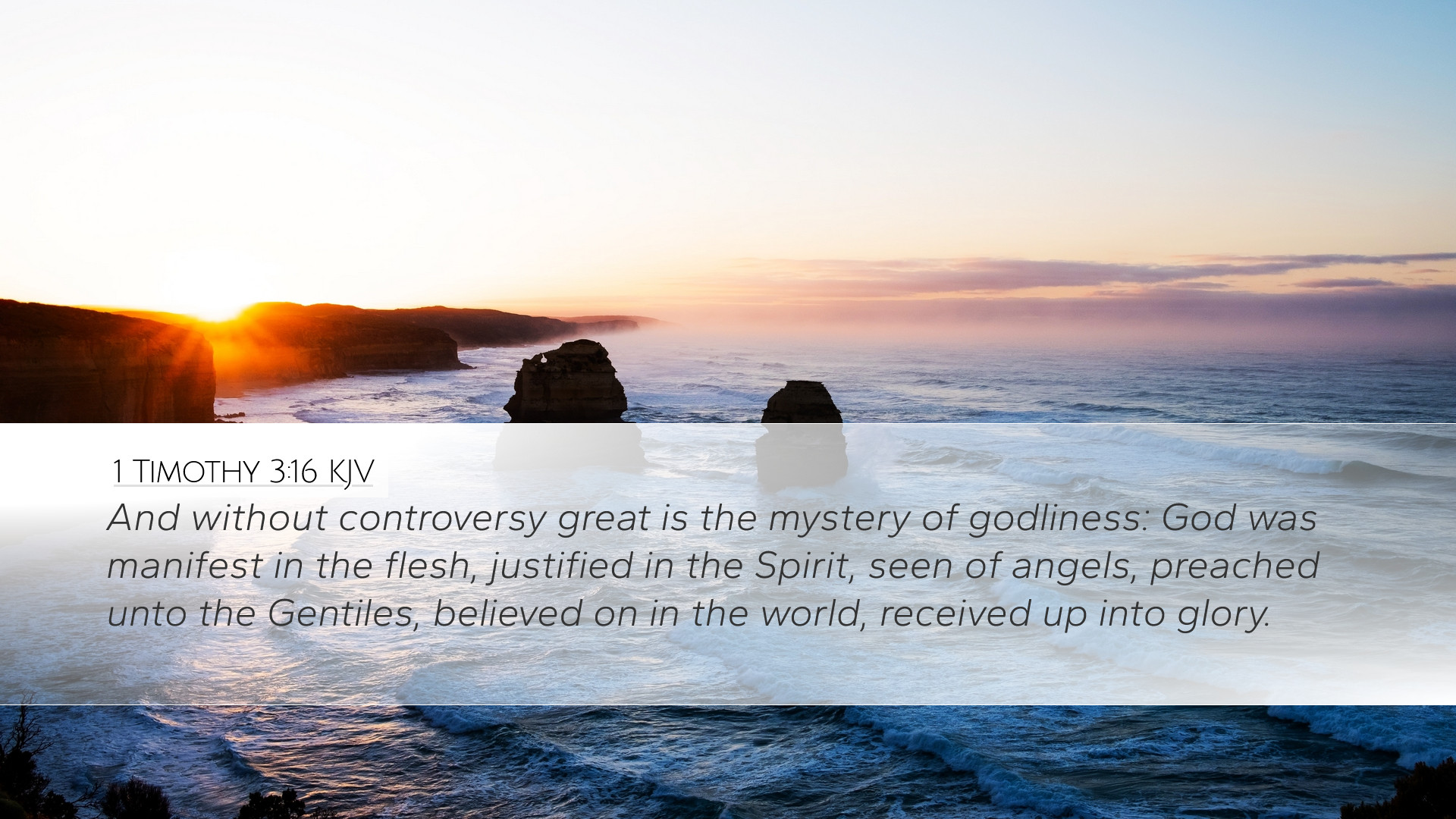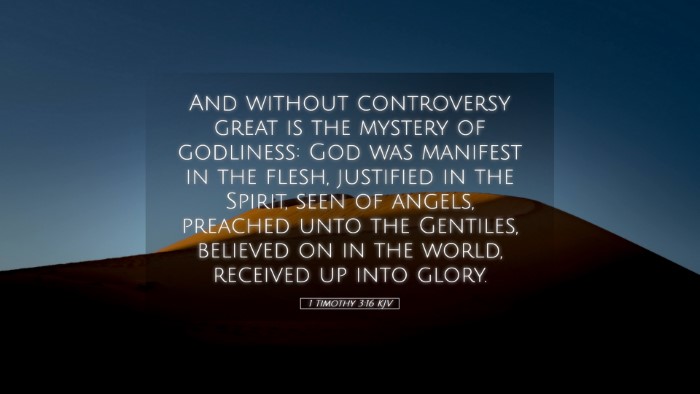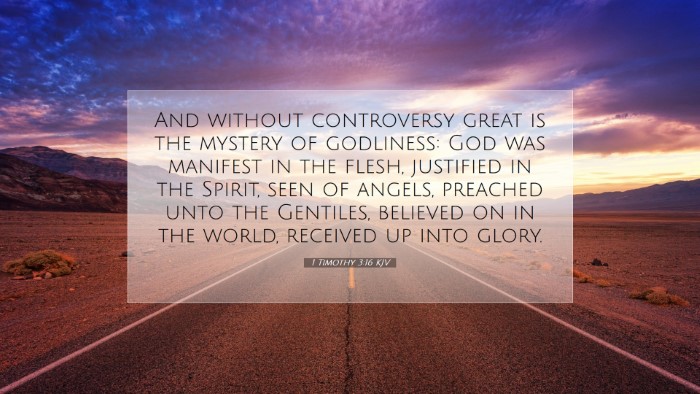Old Testament
Genesis Exodus Leviticus Numbers Deuteronomy Joshua Judges Ruth 1 Samuel 2 Samuel 1 Kings 2 Kings 1 Chronicles 2 Chronicles Ezra Nehemiah Esther Job Psalms Proverbs Ecclesiastes Song of Solomon Isaiah Jeremiah Lamentations Ezekiel Daniel Hosea Joel Amos Obadiah Jonah Micah Nahum Habakkuk Zephaniah Haggai Zechariah Malachi1 Timothy 3:16
1 Timothy 3:16 KJV
And without controversy great is the mystery of godliness: God was manifest in the flesh, justified in the Spirit, seen of angels, preached unto the Gentiles, believed on in the world, received up into glory.
1 Timothy 3:16 Bible Commentary
Commentary on 1 Timothy 3:16
Bible Verse: “And without controversy great is the mystery of godliness: God was manifest in the flesh, justified in the Spirit, seen of angels, preached unto the Gentiles, believed on in the world, received up into glory.”
Introduction
This verse stands as a pinnacle of doctrinal significance within the pastoral epistles. It encapsulates the essence of the Christian faith, detailing the nature and mission of Christ as well as the implications for the Church. The phrase “great is the mystery of godliness” invites a profound exploration of the theological truths surrounding Christ's incarnation and salvation.
The Mystery of Godliness
The term “mystery” here refers to a truth that was once hidden but is now revealed through revelation. Matthew Henry outlines that while the knowledge of God was known to the ancients, the full understanding of godliness was made known through Christ. This concept suggests that the essence of true piety is not only in adherence to moral conduct but in a relationship with the divinely revealed person of Jesus Christ.
Implications of Christ's Manifestation
- Manifestation in the Flesh: This underscores the dual nature of Christ—fully human and fully divine. Adam Clarke highlights that "God was manifest in the flesh" speaks to the incarnation, affirming that the divine nature took on human form to relate to humanity.
- Justified in the Spirit: Albert Barnes points out that Christ's justification by the Spirit reflects His sinlessness, attesting to His divine nature through His works. The Holy Spirit’s role in Jesus’ ministry makes evident His identity and the acceptance of His sacrifice.
- Seen of Angels: Angels ministered to Christ throughout His life and were witnesses to His resurrection and ascension. This acknowledgment serves as both testimony to His divine nature and the significance of His mission.)
- Preached unto the Gentiles: The proclamation of the gospel to the Gentiles is essential, illustrating that salvation through Christ is available to all mankind, not restricted to a chosen race. This transformative truth repudiates exclusivism.
- Believed on in the World: The propagation of faith in Christ throughout the world demonstrates the fulfillment of the Great Commission and the global reach of the gospel, as emphasized by Henry. This emphasizes the universal applicability of Christ’s redemptive work.
- Received up into Glory: The ascension of Christ validates His divine authority and assures believers of His sovereignty. Clarke notes that this event not only confirms the completion of His earthly ministry but also heralds His exaltation and eternal reign.
Theological Significance
The condensed truths presented in this verse serve as a foundational statement for understanding Christology and soteriology in both historical and contemporary context. Each phrase is loaded with doctrinal implications that speak to the nature and essence of the gospel. Matthew Henry argues that this verse serves as a touchstone for evaluating Christian doctrine, asserting that any deviation from these truths can lead to a misunderstanding of the faith itself.
Contrasting with False Teachings
This declaration of faith stands in stark contrast to the false teachings that arose in the early Church, which Paul addresses throughout the epistle. By emphasizing the mystery of godliness, Paul encourages the Church to cling to the truth of Christ amid confusion and deception. Clarke emphasizes the importance of sound doctrine, noting that understanding Christ correctly is imperative to a healthy faith community.
Application for the Church
As a body of believers, the Church is called to uphold and teach these profound truths. Engaging with the mystery of godliness encourages a deeper devotion and commitment to discipleship. For pastors and theologians, this verse serves not only as a theological anchor but also as a rallying point for evangelism and spiritual growth within their congregations.
Encouragement for Believers
This verse offers great encouragement to believers navigating a complex world filled with competing narratives. The assurance that God manifested in the flesh assures believers of His intimate involvement in human affairs. This truth fosters hope and inspires a life of holiness in response to the divine initiative.
Conclusion
1 Timothy 3:16 is a rich tapestry of theological truth, weaving together the essential elements of the Christian faith. It serves as a reminder of the mystery of godliness rooted in Christ’s incarnation, life, and redemptive work. For pastors, students, and scholars, this verse provides a critical framework for understanding the deeper implications of faith, doctrine, and practice within the life of the Church.


